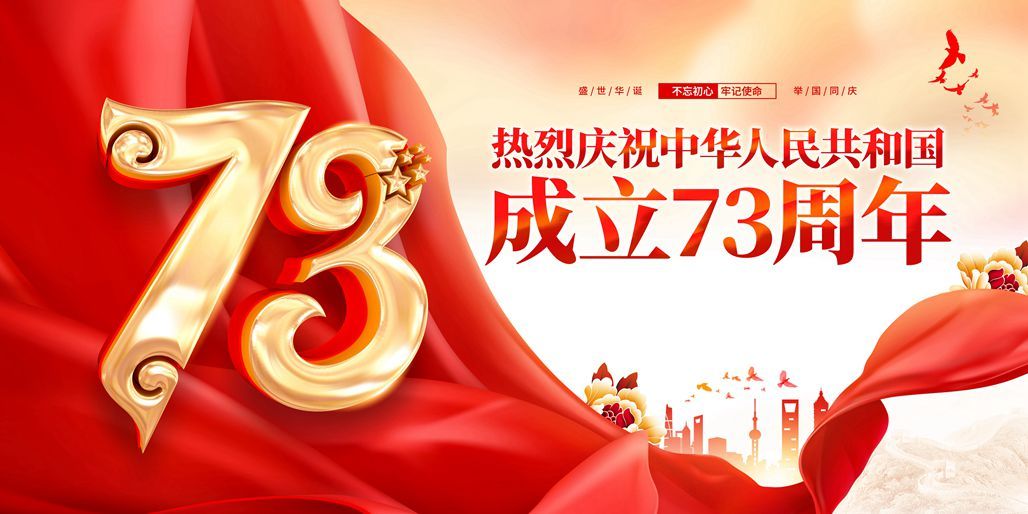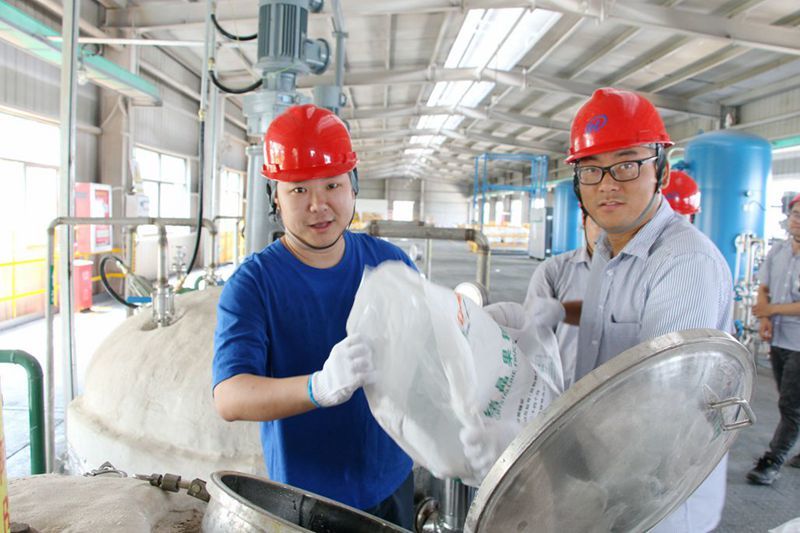
Talk about splenda: Is it really a good thing to eat sweet without worrying about putting on weight?
Release time:
2020-07-31
Recently, no sugar, sugar, the wind, blowing is really too big...

Shanghai Jingan Center, billboards are all of them! It used to be luxury... (Photo credit: chinanews.com)
In the convenience store, the C drinks are almost all sugar substitute diet drinks, fat house happy water is squeezed to the corner.

Ice cream and milk tea shops have also added sugar substitutes to their menus.

In an age of sugar phobia, the ability to indulge in sweet without worrying about calories or weight gain sounds like a wonderful thing.
So good that people can't help but wonder: is there really such a good thing in the world?
Today, we are going to have a good steak of splenda, starting with the most concerned questions
Splenda can really do it all at once
Does it taste sweet and not fat?
What is the difference between the sweetness of artificial sugar and the sweetness of ordinary sugar? How does it trick our tongues and brains?
Humans are able to taste sweetness by sweetness receptors on their taste buds. When you eat candy, your receptors signal to your brain, "You're getting high!"
Splenda also contains elements that stimulate receptors and make the brain feel sweet. But once inside the body, the heat can't be absorbed.
In simple terms, splenda uses sweet receptors to tell the brain that it is in danger.
But not all splenda can be binge eating without weight gain, there is a question mark.
Sugar-free gum, for example, uses pure substitute sugar and has 1,530 kilojoules per 100 grams, which is not that different from regular sugar.
Coke Zero, also very sweet to drink, but the heat scale is really clean 0.

Why are they all sugar substitutes, but the calories are totally different? Because there are several kinds of sugar!
In simple terms, sugar substitutes can be changed into sugar alcohols and true sugar substitutes.
Sugar alcohols are just some kind of structural change on the basis of sugar. Essence or sugar, eat too much will be fat.

Weight for weight, sugar alcohols have about half the calories of real sugar.
But its purpose, in fact, has nothing to do with controlling heat. Instead, it takes advantage of a different metabolic pathway than sugar:
Sugar alcohols generally have low GI values, are less likely to cause blood sugar fluctuations, and do not need insulin to promote, they can directly through cell membranes to provide nutrients to tissues.

The GI score is the ability of a food to raise blood sugar in the body. The lower the score, the healthier. For example, regular sugar is 100, then artificial sugar is around 10, and even some artificial sugar GI value approaches 0. In other words, sugar specifically for diabetics!
Likewise, it does not cause tooth decay.
And the structure of sugar and sugar is very similar, so the taste can be fake.
We mixed xylitol and granulated sugar into sugar water (10g/100ml) with the same sweetness for blind tasting.
The result: almost no one can tell the difference.
Perhaps that explains why many people can't get used to Zero Coke, but can't tell the difference in the sweetness of chewing gum
Sugar alcohols are nice, but as mentioned before, they have calories, and they're not low in calories, so they're not really tasty or fat!
Let's define our initial question a little more precisely:
Whether it tastes sweet or not,
Is it true that zero calorie splenda doesn't make you fat?
Yes.
Another party in the sugar generation category: True sugar generation, is the recent fire half the sky "zero card generation sugar".
When they're zero calories, are they really zero calories? Well, not really.
But the sweetness of these substitutes is too much! High! Here we go! Only a small amount of input is needed to achieve the desired sweetness. When converted, the heat is almost negligible. Said it had zero cards and nothing wrong with it.
Aspartame, the most commonly used ingredient in Coke Zero, has 4 calories per gram, the same as sugar
But it's about 200 times sweeter than table sugar. Coke Zero has 58mg of aspartame per 100g and 0.2 calories
According to the source and process, the zero calorie sugar can be subdivided into natural sugar and artificial sugar.
According to GB2760-2014 "Standards of the People's Republic of China for the Use of Food Additives", a total of 20 kinds of sweeteners are allowed to be added in food. The table lists only the non-nutritional sweeteners commonly available in the market.
Start with artificial sugar substitutes. It's a completely synthetic, sweet-smelling chemical. Like aspartame, acesulfamil, sucralose... From the name, it's industrial, isn't it?
As unpleasant as that sounds, artificial sugar substitutes have been developed much earlier. It predates natural sugar substitutes by more than 100 years.
The earliest artificial sugar you've heard of is saccharin. It was discovered in 1878.
The cost of artificial sugar substitutes is low because they are early and there is enough production capacity.
We refer to the average price on Taobao. The average price of artificial sugar substitute is 60-100 yuan /kg, which is several times lower than the price of white sugar according to the sweetness.
It's popular not only in diet drinks, but also in unexpected snacks.
Latiao, which I enjoyed when I was a child, also contains sucralose, Neotame...
But what about taste?
Take Happy Water, for example: Whether it's Zero, a combination of acesulfame-aspartame, or Pepsi's Extreme, it has a shorter, thinner finish than the original. And when you swallow it, it leaves a little bit of a sticky texture on your tongue.
In human terms, it is "fake sweet".
That's why it's called Fat House Happy Water. How can you be happy without being fat:)
The sugar water made directly with artificial sugar substitute, the taste is more obvious. It tastes disgusting...
By contrast, mints, which are sweetened with sugar alcohol and a dash of aspartame, are much less unpleasant. When you eat it, it's closer to real sugar.
The disadvantage is that there is heat...
And the natural sugar substitute, is a sweet substance purified from the natural plants which are very sweet. Common varieties like arhat fructose and stevia sound healthy.
However, it also has disadvantages: first, the cost is higher, about several times that of artificial sugar substitute.
The high purity stevia glycoside is priced at 500 yuan /kg and the Grosvenor glycoside at 450 yuan /kg
Second, the taste... It still doesn't work.
Whether it's stevia, arhat's fructose, or the more niche arabinose, they all have a distinctly grassy flavor. This feeling of discomfort is even more obvious than artificial sugar substitutes.
Coca-Cola has also produced a pure stevia flavoured version. However, the taste was not welcome and it was soon off the market
So, as you can see, even zero calories, which are very sweet, don't taste very good.
I know what you're gonna ask me next.
Have you stopped gaining weight,
The yummy zeros?
Well, the same answer: Yes.
Most zero-calorie beverages on the market, as well as various types of zero-calorie candy, use a combination of sugar-tasting sugar alcohols and high-sweetness sugar substitutes.
But if sugar alcohols have calories, how do they get to zero?
That brings us to erythritol, the hot chicken of the sugar substitute world.
Although it is formed by the fermentation of glucose, it is also a type of sugar alcohol. But compared to other sugar substitutes, it's almost like it's broken...
First of all, the taste is more pleasant than high sweetness substitute sugar.
In this review, it was the second highest scorer after xylitol.
Secondly, they are also calorie-friendly (147KJ/100g) compared to other sugar alcohols.
Only about a tenth of the calories of xylitol, of which 80 percent cannot be metabolized by the body. The caloric surplus from the remaining 20% is offset by the amount of energy the body uses to break it down.
The original brand of fire, which I'm sure you've all drunk, was the Forest of Vitality.
The biggest problem with erythritol is... Too expensive:)
On average, it is about 30 yuan /kg, 5 times that of white sugar.
It doesn't seem that expensive, does it? Don't forget it's still sugar alcohol! The sweetness is very low, only about 60-70% of that of white sugar.
In other words, it takes nearly twice as much erythritol to achieve the original sweetness.
So a new recipe was found: a combination of erythritol and sweet splenda to create a complex splenda.
Such substitutes are much more natural in taste than high-sweetness substitutes and cheaper in cost than pure erythritol;
The sweetness provided by white sugar costs about 42.86 yuan with pure erythritol, but the cost can be reduced to 30.94 yuan with complex sugar substitute (99.8% erythritol +0.2% stevia side). Just 1kg can save nearly 12 yuan, how much quantity capacity saved, you calculate......
(Take erythritol with cost of 30 yuan /kg and sweetness of 0.7 as an example)
But also can adjust the ratio, and sugar to maintain the same sweetness, much more convenient to use.
After all, high-sweetness substitutes are so dense that a pinch of them will give you a real taste of what it's like to be uncomfortably sweet...
Your product, good taste, no heat, low price, easy to use, all the advantages that should be taken. No wonder it's so popular, it really smells good...
So now, the most common diet drinks and foods on the market use it;
For example, Hicha's new zero-calorie drink, Hixiao Tea Bottler, is a combination of erythritol and sucralose.
Taobao sells zero card sugar, most of it.
We also bought a package of erythritol based compound zero calorie sugar. With the same proportion of sugar water, the taste is natural, and the sweetness is almost the same as granulated sugar. 1:1 instead, really convenient!
However, none of the commercially available saccharides can do the Maillard reaction.
The temperature also changes the taste slightly.
Seeing this, I know you may still be a little worried:
Is it really possible to be delicious and not fat at the same time?
Is splenda really no harm at all?
Doesn't that fit the law of conservation of energy on Earth??
You can eat sweets without getting fat,
Is there really such a good thing in the world?
Indeed, splenda sounds so cheating that it's hard not to wonder about its safety.
We are not the only ones who doubt it. From the official use of artificial sugar to now, the world has been noisy for decades. If you look at the history of research, it's like watching a great tug of war.
For example, aspartame has the most data, and here is the incomplete record
Opponents point to animal experiments and population studies that question the toxicity and effects of artificial sugar substitutes.
The result of each question, and by the supporters with more powerful refutation, one by one back.
All kinds of you come to me to dispute, the biggest pot, every kind of sugar back: fat theory.
Various observational studies have reported higher rates of fat around the waist and obesity and higher daily calorie intake in people who consume zero calories.
Then this conclusion is endlessly hyped by the media, news and publicity.
But they forgot one thing: before the craze, 80 percent of the people who ate zero calories were overweight, already struggling with weight and appetite.
Instead, the original experiments showed that there was little difference in appetite and calories consumed that day between artificial and natural sugar substitutes and sucrose in the same sample.
So, the idea that sugar substitutes directly cause obesity and appetite has not been proven to be true.
In contrast, there is another related conclusion: sweetness can affect the brain's appetite centers, stimulating people to eat more. It really doesn't make any difference whether the sweetness comes from real sugar or substitute sugar.
So, the point is to eat less sweet, rather than throw the whole pot at the splenda.
There is also a common misconception that artificial sugar substitutes are not edible and natural sugar substitutes are safe.
Not really. Splenda is splenda.
Artificial sugar substitutes are older and better studied, so there is more public opinion. Many people have heard that aspartame and acesulfamil can be harmful, but are unaware of the subsequent reversals and reversals.
Instead, natural sugar substitutes, which have been around much longer and whose research results are less transparent, are more likely to be paid for thanks to their fancy name and hype.
In fact, natural sugar substitutes also have a history of being questioned about safety and toxicity. However, the business will not admit; Naturally, people who distrust chemicals equate natural with safe.
... It sounds like it's actually kind of double-signed.
Stevia, for example, was banned in 1981 because of insufficient data and proved safe only in 2008. Hong Kong also removed all stevia products from its shelves between 2003 and 2010 because it was deemed to be carcinogenic.
Anyway, all those years of fighting. Both natural and artificial sugars are still safely included in JECFA, FDA and Standard for the Use of Food Additives of the People's Republic of China.
Joint FAO and World Health Organization Expert Committee on Food Additives
United States Food and Drug Administration
That said, there is no theoretical evidence that splenda is harmful.
However, there is an attribute to add before: so far.
After all, as a product only emerged in recent decades, the research duration is not long, the potential effects and dangers, are unknown, can not be said to be absolutely safe in the real sense.
But, in the parlance of toxicology: it's all hooliganism to talk about toxicity without measuring it.
Products that can be included in the regulations are perfectly safe for most people as long as they are consumed within the prescribed reasonable daily intake.
Common daily intake of sugar, we also sorted out, for your reference
Is more cautious than we might think. The number without side effects was obtained through animal studies, and then divided by ADI index 100.
For example, if stevia has been shown to have no side effects at 400mg/kg/ day, its ADI would be 4mg/kg/ day.
Most splenda are very, very sweet, and in turn, a very small amount is needed to achieve the desired sweetness.
So, as long as you're not drinking sugar-replacement drinks as water, it's hard to exceed this limit.
Buy sugar substitutes,
You may also encounter these potholes
As you know, splenda has made a strong push into the milk tea world.
However, zero sugar syrup, really does not mean that this cup of milk tea without sugar well!
Milk cap, small material... These ingredients, without exception, add to the sugar content and heat of milk tea. We bought several cups of stevia drinks from Joy Tea and measured the sugar content at 10.2-14.6g/100ml, much higher than Coke.
Another smaller milk tea shop uses a type of sugar substitute with saccharin as the main sweetener. Get it... There's no sweetness at all, but a subtle discomfort lingers on the tongue long after it's finished.
In addition, into the supermarket, sugar biscuits, cakes are also a lot. But it's impossible to lose weight on them...
This sugar-free cookie, for example, has no cane sugar but no oil. That's nearly 500 kcal per 100g, which is about the same as five bowls of plain rice.
So, while drinking milk tea to eat snacks, while adding sugar, or will be fat. There is no such thing as pie in the sky, as we all know;)
But the truth may not really matter that much. What we want is the comfort of having milk tea, snacks and (possibly) not gaining weight. To put it bluntly, it's a punk regimen.
Will not grow fat another say, happy is done.
In general, splenda is not as bad as the myth, moderate consumption, no big problem; But it's also not as magical as it's cracked up to be, a shortcut to weight loss, or a sweet chip to be indulged in.
It's more like a placebo in an age of caloric anxiety.
After all, life is hard enough, but there is no greater pleasure than having a guilt-free sweet.
Reference materials:
1. Research Progress on toxicity and synthesis factors of aspartame, Zihan Wang, Xiquan Li, Weiwei Yang
2. Liu Yang, Cong Zhao, Mo Yao, Bing Zhao, Runge, Shuting Huang, Yumei Wang, Shifeng Ni, et al., Application and Toxicity of xylitol
3. Research progress on the safety of stevia side, Xiaoyu Li
4. Sweeteners, sugar alcohols and caries, Sun Jianguang, Gao Junlian
5. National Food Safety Standards for Food Additives (GB 2760-2014)
6. Effect of stevia, Aspartame, and sucrose of food intake, saftiety, and post prandial glucose and insulin level. Stephen D. Anton, Corby K. Martin, Hongmei Han, Sandra Coulon, William T Cefalu, Paula Geiselman, Donald A Williamson.
7. Expert consensus on low-calorie sweeteners: facts, research gaps and suggested actions, Margaret Ashwell, Sigrid Gibson, France Bellisle, etc.
8. U.S. Food & Drug Administration: High-Intensity Sweeteners
This article is adapted from (Original Kai Ji Penguin Eating and Drinking Guide). Please contact (0550-5624224) to delete any infringement
Related news


![[Deepening cooperation and writing a new chapter] Jinhe Industry and Dingyuan County People's Government held the signing ceremony of "Jinhe Industry Dingyuan County Phase II Project" [Deepening cooperation and writing a new chapter] Jinhe Industry and Dingyuan County People's Government held the signing ceremony of "Jinhe Industry Dingyuan County Phase II Project"](https://omo-oss-image.thefastimg.com/portal-saas/pg2025082214021798419/cms/image/98711c0d-d505-4277-aa40-e8910450cb69.jpg)





 0550-5619509
0550-5619509